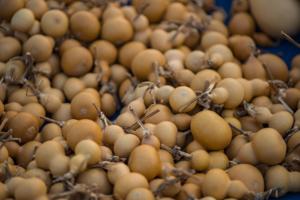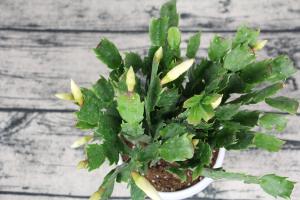Introduction
Tomatoes are a popular fruit among home gardeners and commercial farmers alike. However, many people struggle to get their tomato plants to produce as much fruit as they would like. The good news is that there are several plants that can help tomatoes produce more fruit. In this article, we will discuss the best plant companions for tomatoes and their benefits.
Companion Planting
Companion planting is the practice of planting different species of plants together for mutual benefits. When certain plants are grown together, they can promote growth, repel pests, and improve soil health. Companion planting has been used for centuries, and it is still an effective way to improve the productivity of a garden.
Marigolds
Marigolds are a popular plant companion for tomatoes. They are easy to grow and can provide a host of benefits. Marigolds contain a substance called alpha-terthienyl, which is toxic to many soil-borne pests, including nematodes. They also attract beneficial insects like ladybugs and lacewings, which eat pests that harm tomato plants. Additionally, marigolds release a chemical into the soil that repels root-knot nematodes, which are a common pest of tomato plants.
Basil
Basil is another useful companion plant for tomatoes. Basil has a strong aroma that repels tomato hornworms and other pests that can damage tomatoes. Additionally, basil contains oils that inhibit the growth of some harmful bacteria and fungi in the soil, which can improve soil health and plant growth. Basil is also easy to grow and can provide a tasty addition to meals made with fresh tomatoes.
Nasturtiums
Nasturtiums are a beautiful and useful addition to any garden, especially when planted with tomatoes. Nasturtiums attract beneficial insects like hoverflies and parasitic wasps, which prey on pests that can harm tomato plants. They also produce an antibiotic substance that can protect tomatoes from some fungal diseases. Nasturtiums are also easy to grow and come in a variety of colors.
Garlic
Garlic is a popular addition to many meals, but it can also be a useful companion plant for tomatoes. Garlic contains compounds that repel pests like aphids, spider mites, and whiteflies, which can attack tomato plants. It can also help to deter harmful soil-borne pathogens that can harm tomato plants. Additionally, garlic can improve soil health by increasing the availability of certain nutrients and reducing the incidence of soil-borne diseases.
Conclusion
By planting companion plants alongside tomatoes, you can help to improve their growth, productivity, and overall health. Marigolds, basil, nasturtiums, and garlic are just a few of the many plants that can benefit tomatoes. Consider planting some of these companions in your own garden to help your tomatoes produce more fruit.

 how many times do yo...
how many times do yo... how many planted tre...
how many planted tre... how many pine trees ...
how many pine trees ... how many pecan trees...
how many pecan trees... how many plants comp...
how many plants comp... how many plants can ...
how many plants can ... how many plants and ...
how many plants and ... how many pepper plan...
how many pepper plan...































